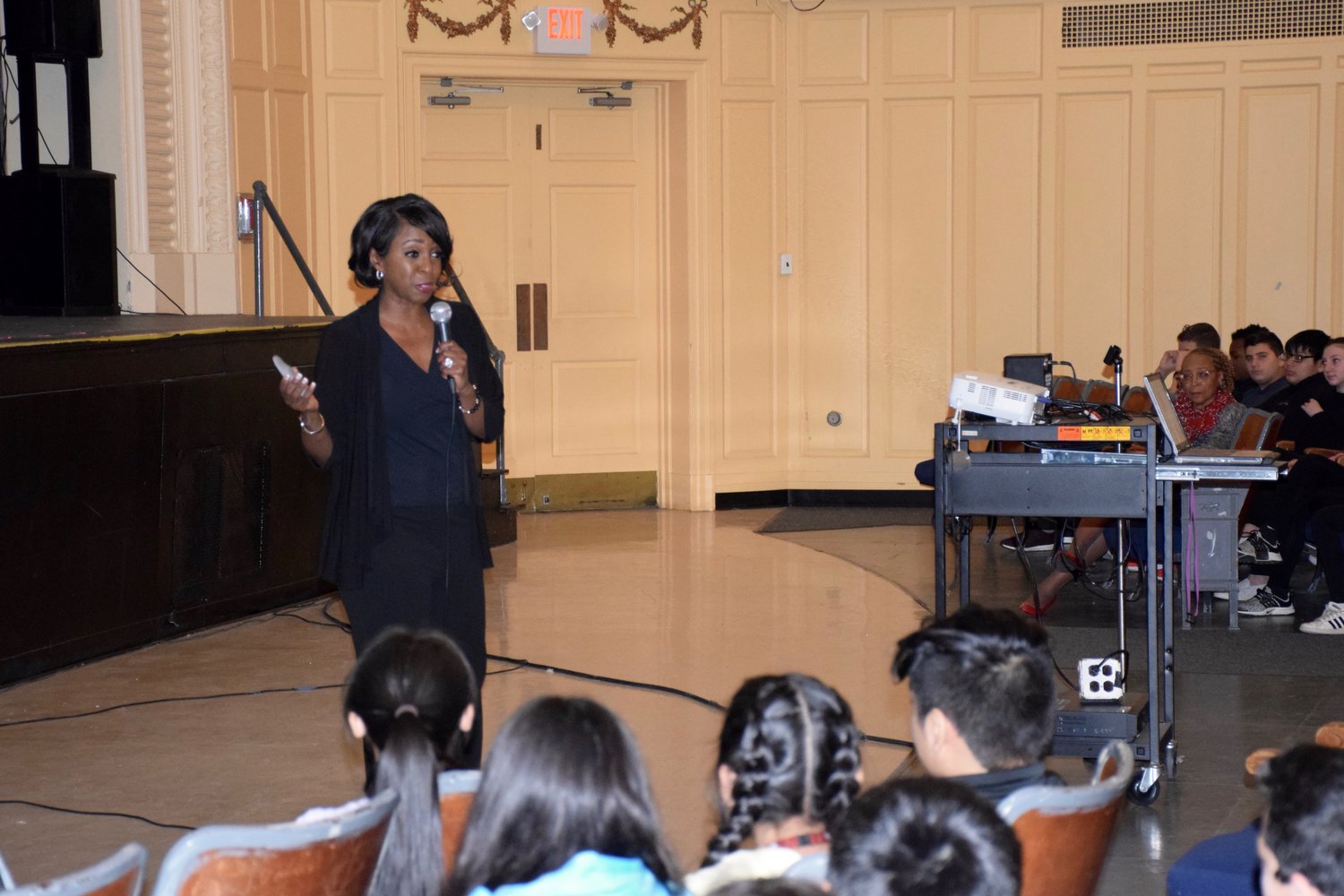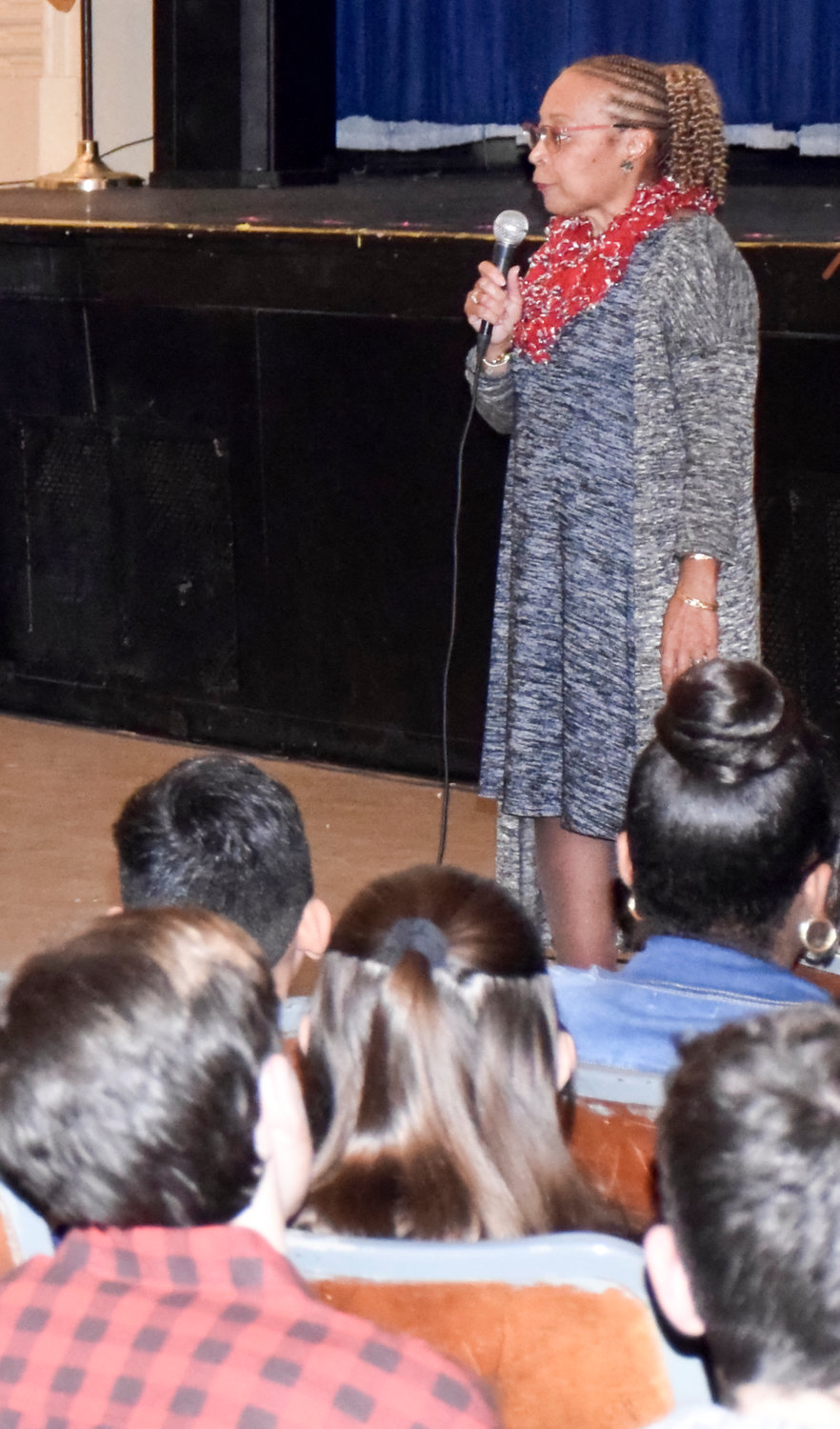Friday, April 19, 2024
 44.0°,
Mostly Cloudy
44.0°,
Mostly Cloudy
NY1 news anchor shares her ancestry with Glen Cove students
There was no shortage of energy among the eighth-graders gathered in Finley Middle School’s auditorium when NY1 news anchor Cheryl Wills stopped by on Feb. 5 to speak about her family’s connection to the Civil War. Joined by Sheryl Goodine, a former Glen Cove High School assistant principal and current chairwoman of the city’s Dr. Martin Luther King Jr. Birthday Commission, the two spoke on the importance of family and ancestry during the celebration of black history.
Wills began her presentation by introducing its subject, her ancestor Sandy Wills, a former slave who ran away from a plantation in 1963 and joined the Union army during the Civil War. She then spoke on her life as an African American woman growing up in the projects of New York City. After her father, Clarence Wills, died when she was 14, Wills said she had to overcome an incredible amount of adversity on her quest to achieve her dreams.
When telling that part of her story, Wills emphasized her belief that the spirit of the United States lies in the hearts of its common people. “America doesn’t belong to a few rich people,” she said emphatically. “It belongs to you!”
And “…don’t let anyone tell you that that dream is impossible,” she added.
Both statements were met with enthusiastic applause.
She concluded by saying that she would never have reached her aspirations had it not been for her ancestor’s efforts.
Then Goodine shared her story. Growing up in Glen Cove, she went to the segregated South School, which she said was made up almost entirely of black students. Her father, Jimmy Davis, believed that segregated schools had no place in the city. He eventually sued the school district and won.
Extending far past the borders of Glen Cove, Davis’s fight for civil rights required that he regularly travel to the south to march with Martin Luther King. Goodine said that her father’s actions often put his life at risk, describing an incident in which he was almost shot while staying at a friend’s home simply for wanting to march.
Goodine used her father’s story as an example of how the actions of one family member can impact the lives of the rest of the family. “Let us never forget we all stand on someone else’s shoulders,” she said.
Wills then spoke about her ancestor, Sandy Wills, whom she researched on a genealogy website in 2009.
Sold for $500 when he was 10-years-old to a plantation owner Edmund Wills, Sandy was separated from his mother. He was forced to work all day in the Tennessee heat, picking cotton. “Cotton was king and Sandy was destined to pick it forever,” Wills said.
During his 20s at the height of the Civil War, Sandy, and a few fellow slaves escaped the Will’s plantation and headed for the north. Sandy was determined to help in the emancipation of all slaves, Cheryl said. He joined the U.S. Colored Troops, becoming one of 200,000 black soldiers in the Union Army. After the war, he found his mother and met his wife, Emma Moore, with whom he started a family of which Cheryl said she is immensely proud.
Wills said that one of the most important ways people could honor the legacies of ancestors is to stop using the “n word,” which she described as “destructive.” She said that the racial slur maintains its power due to its constant use in various forms of the media. When she asked the students if they would help eliminate the word from American culture, nearly every hand in the audience shot up. Then the students shared in a loud round of applause.
After the presentation, the Herald Gazette spoke with multiple eighth-graders on their thoughts about what Wills had to say. Each of them shared only positive remarks.
“She feels so passionate, she cares so much,” said Cara Genova. “It made you feel like you were a part of it.”
Jake Casale said of the presentation, “Everyone in this auditorium will remember it.”
Goodine said that she truly appreciated Wills’s emphasis on the importance of knowing one’s family story, especially in reference to how we can use the stories to make the world a better place.
“I think many of the students, and some of the teachers too, might be encouraged to do their own search for their ancestors,” Goodine explained, “because I’m sure there are many stories right here in this auditorium but the kids don’t know. It’s just an inspiration.”
On what effect she hoped Wills’s presentation had on the students, Sheena Jacob, Glen Cove City School District’s social studies coordinator, said, “…that they understand that there is a world for them, that there is a place, that they find their way and make a positive difference and bring it back to the community, to the county, to state and to the nation.”
Wills said it was an honor to bring her story to Finley, that it is pivotal to her that people remember the effect that people such as Sandy had on the development of the United States and the abolition of slavery. It is vital for Americans, she said, to know their family’s history, describing the many Americans’ lack of knowledge on the subject as somewhat of “an epidemic.”
“I think everyone has their own Sandy Wills,” Wills said. “Everyone has someone in the family who did something extraordinary.”
However, she said, there is one thing in particular she hopes made an impact. “The biggest thing I hope [the students] got out of it, believe it or not, is the ‘n word,’” she explained. “I am on a very personal crusade to stop it.”
“Young people are very powerful,” she said. “They don’t know it, but when they rise up, the world listens.”
HELP SUPPORT LOCAL JOURNALISM
The worldwide pandemic has threatened many of the businesses you rely on every day, but don’t let it take away your source for local news. Now more than ever, we need your help to ensure nothing but the best in hyperlocal community journalism comes straight to you. Consider supporting the Herald with a small donation. It can be a one-time, or a monthly contribution, to help ensure we’re here through this crisis. To donate or for more information, click here.
Sponsored content
Other items that may interest you







